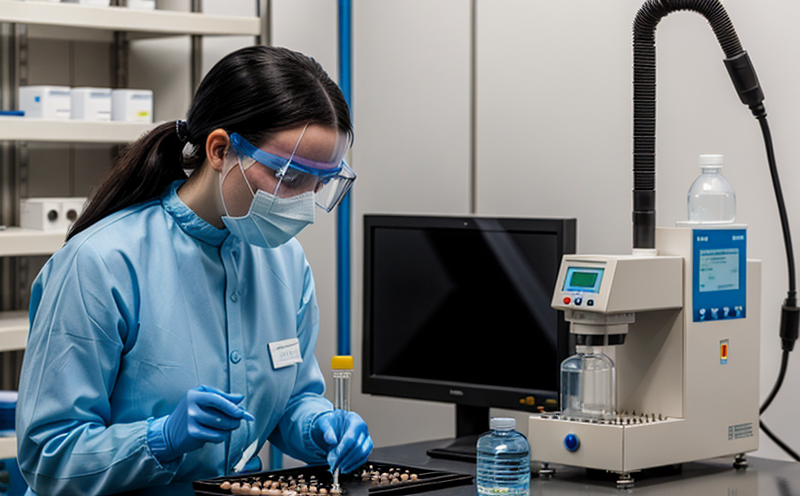Zinc Impurity Profiling Testing
The process of Zinc Impurity Profiling Testing is essential in pharmaceutical testing to ensure drug product quality and safety. In the context of the pharmaceutical sector, impurities can arise from various sources such as raw materials, manufacturing processes, or packaging materials. Zinc, a common metal, can be introduced into pharmaceutical products through these pathways, leading to potential risks for patients.
Our laboratory specializes in providing comprehensive zinc impurity profiling services using advanced analytical techniques tailored specifically for the pharmaceutical industry. This ensures that our clients receive accurate and reliable results which are crucial for meeting regulatory standards like those set by FDA, EMA, and other international bodies.
The testing begins with thorough sample preparation, where we ensure that the zinc content is accurately represented. We employ a range of analytical methods including but not limited to Inductively Coupled Plasma Mass Spectrometry (ICP-MS) and Atomic Absorption Spectroscopy (AAS). These tools enable us to detect trace amounts of zinc down to parts per million levels, which are critical for identifying impurities.
Once the samples have been analyzed, detailed reports are generated outlining the concentration levels of zinc and any other detected metals. Compliance with international standards such as ISO 17025 is strictly adhered to throughout our testing procedures ensuring that all results are valid, reliable, and repeatable.
To ensure consistency and accuracy, we follow rigorous quality control measures at every stage of the process. This includes regular calibration checks on equipment, participation in proficiency testing programs, and continuous training for our technical staff.
| Methodology | Description |
|---|---|
| ICP-MS | Highly sensitive method capable of detecting low levels of metals in solutions. |
| AAS | Optical emission technique used for determining the concentration of various elements. |
| Compliance Standards | Standards Applied |
|---|---|
| FDA Regulations | 21 CFR Part 803 - Medical Device Reporting. |
| EMA Guidelines | MEDDEV 97/67 EU - Good Manufacturing Practices for Medical Devices. |
In summary, zinc impurity profiling testing is a vital component of ensuring drug product safety and efficacy. By leveraging our expertise in pharmaceutical testing combined with cutting-edge analytical technologies, we provide clients peace of mind knowing their products meet the highest standards.
- Ensures compliance with regulatory requirements.
- Identifies potential risks early on in the manufacturing process.
- Promotes patient safety by minimizing exposure to harmful impurities.
Industry Applications
Zinc impurity profiling testing plays a crucial role across multiple sectors within the pharmaceutical industry. Here are some key areas where this service is particularly valuable:
| Sector | Description of Application |
|---|---|
| Drug Manufacturing | Ensures that raw materials and intermediates used in the production process do not introduce unwanted zinc impurities into final products. |
| Pharmaceutical Packaging | Detects any zinc contamination from packaging materials which could leach into the drug product during storage or distribution. |
| Research & Development (R&D) | Supports R&D teams in optimizing formulations and processes to reduce the presence of zinc impurities. |
In addition, our testing services can help pharmaceutical manufacturers adhere to stringent quality assurance protocols. This is especially important given increasing public scrutiny regarding product safety and efficacy.
Environmental and Sustainability Contributions
- Reduction of Waste: By identifying zinc impurities early in the manufacturing process, we help minimize waste by preventing the release of contaminated products into the environment.
- Resource Efficiency: Our testing ensures that resources are used efficiently without compromising on quality standards. This reduces unnecessary resource consumption and associated environmental impacts.
- Eco-Friendly Packaging: By detecting zinc contamination in packaging materials, we support the development of more sustainable packaging solutions which can be recycled or disposed of safely.
The pharmaceutical industry has a significant responsibility to contribute positively towards sustainability goals. Our zinc impurity profiling testing aligns with these objectives by promoting responsible resource use and waste management practices.
Use Cases and Application Examples
| Case Study | Description |
|---|---|
| A multinational pharmaceutical company faced challenges meeting EU regulatory requirements for zinc impurity limits in one of its key products. | We conducted comprehensive zinc profiling tests which revealed trace amounts of zinc in a newly sourced raw material. By addressing this issue promptly, the company avoided potential delays and financial losses associated with non-compliance penalties. |
| During internal R&D efforts to improve a widely-used medication, our testing identified an unexpected source of zinc contamination from an auxiliary component used during formulation. | The findings led to process changes that significantly reduced the zinc content in subsequent batches. This not only improved product quality but also enhanced patient safety. |
These examples illustrate how our zinc impurity profiling testing can address specific challenges faced by pharmaceutical companies, ultimately contributing to better product quality and regulatory compliance.





